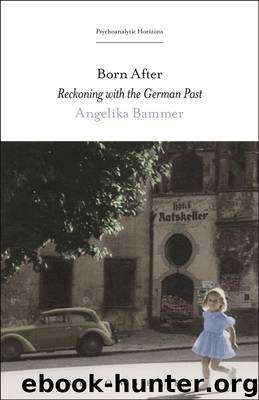Born After by Bammer Angelika;

Author:Bammer, Angelika;
Language: eng
Format: epub
Publisher: Bloomsbury USA
Flak: “Defensive Fire Over a German City, 1940.” (Photographer unknown. Courtesy of ullstein bild)
In the burning city, buildings glowed crimson; their burned-out skeletons shimmered ghostly white. As news of the disaster spread, horrified witnesses provided details. The ferocious firestorm had sucked everything into its vortex. “People by the thousands,” a Berlin reporter wrote, “ran through the streets like flaming torches, got mired in red-hot asphalt, [and] leapt into the waters of the river Elbe.”15 For days afterwards, an ashen pall blocked the sunlight, while the stench of rotting bodies filled the air. Charred corpses and parts of bodies lay scattered like debris after a storm. Small children had often simply been vaporized. Some 35,000–40,000 people had perished.16 Billy Pilgrim’s “loveliest city” was “a city of the dead.”17
The shock of Dresden caused the strategy of aerial bombing to be reviewed. The goal of sowing terror had been effective and it seemed just retribution for Germany’s crimes. “Terror bombing,” some argued, could be justified as “moral bombing.” Germany had sowed the wind when it bombed Warsaw, Rotterdam, and Coventry. It reaped the whirlwind in Hamburg and Dresden. Yet in the wake of Dresden this righteous sense of retribution faltered. An ethical line had been crossed. On March 28, 1945, Churchill ordered a halt to the bombing of German cities. The Allied air war was officially ended.
The specter of Dresden—images of my parents’ honeymoon mixed with the horror of the firebombing—came back to haunt me when my children were in their teens. A friend had invited us to a Passover Seder and, while there were other non-Jewish guests, we were the only Germans. Toward the end of the evening, after pieces of the afikomen had been distributed, we were sitting around the table, chatting. Coffee had been poured, sweets were being passed. My son, Nicolas, sat across the table from me.
“Dresden,” I suddenly heard someone say. It was the woman sitting next to Nicolas. Somehow the conversation had turned to World War II and the firebombing.
“It served them right,” I heard her say. “The Germans got what they deserved.” For a moment the conversation halted. Everyone seemed to hold their breath. Into the silence she added, calmly, “More of them should have been killed.”
I looked at my son and saw my parents’ features: my father’s lips and hazel eyes, my mother’s chin line. This was their grandson. Their history was partly his history too. A rush of emotions pressed my thoughts into words, and I addressed the woman who had made the Dresden comment.
“What you said is your opinion. I understand that. But as my parents’ daughter and my children’s mother, I can’t agree.”
Download
This site does not store any files on its server. We only index and link to content provided by other sites. Please contact the content providers to delete copyright contents if any and email us, we'll remove relevant links or contents immediately.
| African | Asian |
| Australian & Oceanian | Canadian |
| Caribbean & Latin American | European |
| Jewish | Middle Eastern |
| Russian | United States |
4 3 2 1: A Novel by Paul Auster(11788)
The handmaid's tale by Margaret Atwood(7446)
Giovanni's Room by James Baldwin(6808)
Asking the Right Questions: A Guide to Critical Thinking by M. Neil Browne & Stuart M. Keeley(5355)
Big Magic: Creative Living Beyond Fear by Elizabeth Gilbert(5350)
Ego Is the Enemy by Ryan Holiday(4954)
On Writing A Memoir of the Craft by Stephen King(4660)
The Body: A Guide for Occupants by Bill Bryson(4580)
Ken Follett - World without end by Ken Follett(4441)
Bluets by Maggie Nelson(4259)
Adulting by Kelly Williams Brown(4231)
Eat That Frog! by Brian Tracy(4147)
Guilty Pleasures by Laurell K Hamilton(4115)
White Noise - A Novel by Don DeLillo(3828)
The Poetry of Pablo Neruda by Pablo Neruda(3813)
Fingerprints of the Gods by Graham Hancock(3731)
Alive: The Story of the Andes Survivors by Piers Paul Read(3728)
The Book of Joy by Dalai Lama(3694)
The Bookshop by Penelope Fitzgerald(3615)
